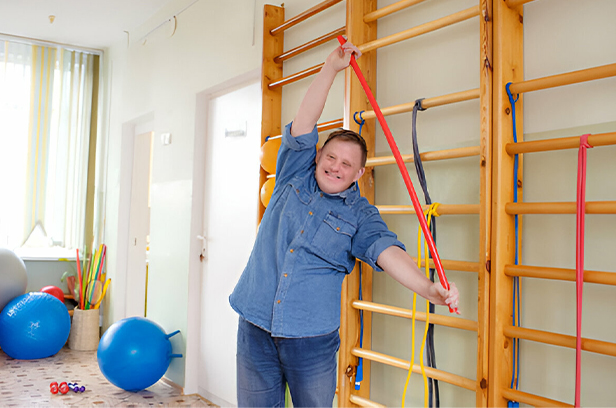
Get to Know All About Stem Cell Therapy for Intellectual Disability
Once referred to as mental retardation, intellectual disability (ID) is characterized by-
• Average intelligence or mental capacity
• Lack of abilities required for everyday life.
Intellectually Disability distorts the overall functionality and can develop new things to do so, but they learn them more slowly. There are different degrees, from moderate to profound, of intellectual disability.
Intellectual disability, what is it? In two areas, anyone with intellectual disabilities has restrictions. Those fields are:
• Intellectual process. Often known as IQ, this refers to the capacity of a person to think, reason, make choices, and fix issues.
• Adaptive habits. These are qualities that are needed for daily life, such as being able to communicate easily, communicate with others, and take care of yourself.
An IQ test tests the IQ (intelligence quotient). For the bulk of individuals scoring between 85 and 115, the average IQ is 100. If they have an IQ of less than 70 to 75, a person is considered intellectually disabled. In order to assess the coping behaviours of an infant, a psychologist may observe the strengths of the child and equate them with other children of the same generation. Things that should be observed include:
• How well the child can feed or clothe himself;
• How well the child can communicate with others and appreciate them; and
• How the child communicates with relatives, peers, and other children of the same age.
Intellectual deficiency is considered to affect approximately 1 percent of the population. 85 percent of the disabled individuals had mild intellectual difficulties. This means that it is only a little slower than average to learn new skills or knowledge. Some will be willing, with the right support, to live happily as adults.
Intellectual Disabilities Stem Cell Treatment in India
People who are looking for stem cell therapy to help with thinking and learning problems in Delhi, India, often find it hard to figure out which are the best places for this treatment and where they can get it at a reasonable cost. Global Stem Cell Care is really helpful in providing stem cell treatment to the people who are suffering from intellectual disabilities.
DO YOU KNOW ABOUT INTELLECTUAL DISABILITY?
Signs of intellectual disability in infants may include delayed physical, language, and social development; difficulty learning new skills; and poor memory. Additionally, infants may display behavior that is inappropriate for their age, lack interest in their environment, and difficulty transitioning between activities. During gestation, symptoms may occur, or they may not be visible before a child reaches school age. It also depends on the disability’s magnitude. The most prominent symptoms of intellectual disability include those of the following:
Global Stem Cell Care provides the best treatment to the patients who are suffering from Intellectual Disability condition, and through the stem cell treatment, their symptoms have also improved.
• Rolling over, seating, crawling, or late walking
• Problems with actions like explosive tantrums
• Slow to learn things such as potty training, grooming, and self-feeding
• Difficulty recalling stuff
• Speaking late or having problems speaking
• Inability to associate behavior with repercussions
• Trouble in issue-solving or critical reasoning
There may be other health issues in children with serious or profound learning impairment as well. These conditions can include convulsions, mood disturbances (anxiety, autism, etc.), deterioration of motor functions, eye difficulties, or hearing problems.
Only stem cell treatment is the cure for this condition, as it helps replace the damaged cells. Global Stem Cell Care has the best team that works for the effective treatment of this medical condition.
SYMPTOMS OF INTELLECTUAL DISABILITY
Intellectual Disability can very well occur if in case anything interferes with the overall natural brain growth. However, it is only about a third of the time that is a particular cause of the intellectual disability and can be found.
The most frequent causes of intellectual deficiency are:
Disease or accident. Infections may lead to neurological disability, such as meningitis, whooping cough, or measles. It may also be caused by significant head injury, near-drowning, acute malnutrition, brain infections, exposure to harmful chemicals such as lead, and serious negligence or violence.
When something interferes with normal brain development, intellectual disability may occur. It’s just about a third of the time, though, that a clear cause of intellectual disability can be found. Many symptoms of intellectual disability are present. Children with an intellectual disability, for example, can:
- Conditions such as Down syndrome and X syndrome, which are delicate.
- Fertility issues. Alcohol or opioid use, malnutrition, certain diseases, or preeclampsia are things that may conflict with fetal brain development.
- Problems in childbirth. When a baby is deprived of oxygen during childbirth or born extremely premature, intellectual disability can result.
- Sitting up, creeping, or walking slower than most kids
- Difficulty communicating
- Finding it hard to recall stuff
- Having problems with understanding social norms
- Finding it difficult to see the outcome of their acts
- Having problems with solving some calculations

DIAGNOSIS
If you are suffering from intellectual disease, then diagnosis is the most important step for an individual before your condition gets worse. You can get better diagnosis from Global Stem Cell Care which is the best stem cell care treatment clinic in India. Diagnosis involves assessing an individual’s cognitive abilities, communication skills, social functioning, and daily living skills. utilize standardized tests, interviews, and observations to evaluate intellectual functioning. Intellectual disabilities occur across various domains, impacting getting to know, problem-solving, and social interactions. A comprehensive diagnosis considers the man or woman’s cultural and environmental context, ruling out their potential causes of impairment. Early intervention and tailor-made help are vital for people with intellectual disabilities to decorate their pleasant existence and foster excellent development.
Types
Mild Intellectual Disability
- Difficulty in communicating and socializing
- Having an IQ range of 50 to 69
- Having problems with writing and reading
- Taking longer to learn to talk
- Difficulty increased with the responsibilities
- Benefiting from specialized education plans
Moderate Intellectual Disability
- Difficulty in understanding and using language
- Trouble communicating
- Unable to live alone
- Can learn essential reading, writing, and counting skills
- Typically having an IQ range of 35 to 49
- Can participate in several types of social activities
Severe Intellectual Disability
- Prominent motor impairment
- Usually having an IQ range of 20 to 34
- Rigorous damage to or abnormal development of the central nervous system
- Little or no communication skills
Profound Intellectual Disability
- Always need a constant help and supervision
- Having an IQ of less than 20
- Unable to take care of their own needs
- Basic nonverbal communication
- Possible immobility
- Inability to understand or comply with instructions

Anytime there is interference with normal brain development, which can lead to intellectual disability. Although the most common causes of intellectual disability may include the following:
- Genetic conditions: These include things like Down syndrome and fragile X syndrome.
- Problems during pregnancy: Things that can interfere with fetal brain development include alcohol or drug use, malnutrition, certain infections, or preeclampsia.
- Problems during childbirth: Intellectual disability may result if a baby is deprived of oxygen during birth or is born extremely prematurely.
- Illness or injury: Infections like meningitis, whooping cough, or measles can lead to intellectual disability. Severe head injury, near-drowning, extreme malnutrition, infections in the brain, exposure to toxic substances such as lead, and severe neglect or abuse can also cause it.
- None of the above: In two-thirds of all sufferers who have intellectual disability, the cause is unknown.

Speech Therapy
One of the most common and evident effects of an intellectual disability is that on the person’s speech and communication, with many children progressing poorly with speech and language skills. A speech therapist is a trained allied health professional who works with people with communication disorders and difficulties. Speech therapy focuses on improving a child’s/adult’s speech and abilities to understand, speak and express language. Speech therapists are responsible for providing services that enable clients to use their voices, pay attention to words, and ability to follow instructions.

Occupational Therapy
This therapy is both a science and an art because therapists who work for occupational therapy centers help people regain their ability to perform everyday tasks by using exercises and retraining. Our occupational therapists also focus much of their work on detecting and eradicating environmental barriers to independence and participation in day-to-day activities akin to everyday life.

Physiotherapy
This therapy can be defined as a treatment method that is focused on the science of movement and aims to help patients to restore, maintain and maximize their physical strength, function, and motion by addressing the underlying physical problems, and also provides adaptive solutions to mobility issues, and increases sensory integration. Additional studies have examined the psychosocial benefits of physical therapist interventions for individuals with intellectual disabilities, identifying significant post-treatment changes in life satisfaction, exercise self-efficacy, positive attitudes toward exercise, and depression risk factors.

Diet Counseling
A diet consultation is an essential part of recovery from one’s health condition. Qualified dieticians give diet consultations to help the patients with the right food and techniques to maintain a good diet and aid in faster recovery. These techniques also help a patient maintain their quality of living. Diet counseling is primarily recommended for individuals who suffer from, or are at risk of developing, a medical condition that results in malnutrition or is undergoing treatment such as stem cell therapy, which benefits from a healthy body. The treatment will focus on assessing and improving eating habits.

Aquatic Therapy
The therapy takes place in a physical form. The treatment is carried out in a specially built water tank with a doctor and is known as Underwater Physical Therapy. This therapy should not be confused with swimming. Aquatics generally means people with disabilities learn how to swim safely in the water. Aquatic therapy holds various techniques that permit patients to improve their balance, body mechanics, and muscle strength. It enhances the rehabilitation process and supports the efficiency of stem cell treatment.
Meghna Raj, Patient of Intellectual Disabilities Patient
My name is Meghna Raj and I am from Gujarat. I’m really thankful for the amazing help I got from Global Stem Cell Care to improve my brain functions. As soon as I went there, everyone was super nice and really cared about helping me. They made a special plan just for me, which was awesome because they understood what I needed. They used really advanced stem cell treatments that gave me a lot of hope, and I could see myself getting way better at thinking and understanding things. The doctors and the whole team at Global Stem Cell Care were like my cheerleaders, always supporting me and making sure I felt okay.
Anderson Benjamin, Came to Global Stem Cell Care, India for Intellectual Disabilities Treatment
Hey, I am Anderson Benjamin from Germany and I came to India for my intellectual disability treatment. Here, I found Global Stem Cell Care which is the best stem cell treatment hospital in India. The way Global Stem Cell Care treated me was super awesome! They really went above and beyond what I expected. The people on their team were so nice and made me feel like they totally got what I was going through. The cool stem cell treatment they gave me has seriously made a huge difference in how I think and remember stuff. My brain feels way clearer now!
Sophie Rodriguez got treatment from Global Stem Cell Care for Treatment of Intellectual Disabilities
My name is Sophie Rodriguez, Paris and I got treatment from Global Stem Cell Care, India for my intellectual disabilities and their doctors help me in my condition. From the first meeting to the check-ins after my treatment, the team showed they really knew their stuff and cared a lot. As time went on, I started noticing big improvements in how I think, remember things, and just how clear my mind is overall. The people at Global Stem Cell Care and their cool facilities really helped me a lot. Thanks to them, I’ve made a lot of progress in dealing with my brain challenges.
Isabella Costa Travel to India For Their Stem Cell Treatment of Intellectual Disabilities
I am Isabella Costa from Portuguese and recently underwent stem cell treatment for intellectual disabilities at Global Stem Cell Care and the result was amazing and miraculous. The awesome team at Global Stem Cell Care really took care of me. They understood what I needed and helped me in a super nice way. My brain works better now, and I feel way happier. The stem cell therapy they gave me was way better than I thought. It made me hopeful and excited about life again. My journey with them has been life-changing, and I wholeheartedly recommend their services to others seeking effective treatments.
IMPLANTATION
Stem cell implantation is very important to cure the disease rapidly. Global Stem Cell Care is the best place for stem cell implantation. These cells have the potential to differentiate into various specialized cell types, potentially repairing and restoring cognitive function. In this treatment, doctors take stem cells from a healthy person and put them into the patient’s brain.These cells then turn into smart brain cells that can make the person think better.
First, we get some special cells from the person or someone else. Then, we grow and make more of these cells in a lab. After that, we put them into the part of the brain that’s not working well because of the learning problem. We hope the new cells will do a better job and make the brain work better.
MECHANISM
The main mechanisms that help tissue repair and regeneration include:-
• Strategies to Help Prevent Cell Death in Neuronal Populations
• Establishment of new blood vessels
• Cell multiplication and integration
• Establishment of new neuronal maps in the brain in order to learn new functions.
This repair and regeneration of the stem cells in the damaged tissue, restores activity in the affected area, which translates into clinical improvements. Stem cell treatment for Intellectual Disability in India, can thus, prove to play a great role in improving the overall quality of life. Autologous BM MNCs also, do not show any adverse side effects and do not face any immune rejection. They are obtained from the same patient and thus are free of the ethical issues surrounding the use of stem cells.


Get Stem Cell Therapy For Intellectual Disability
The presently available Intellectual Disability care services help people to some degree control their academics and their day-to-day lives, but they do not fix the root cause of delayed neurodevelopment. It is also important to establish a typical therapy method for an hour. For people who are suffering from Intellectual Disabilities, scientists and researchers worldwide now accept stem cell therapy as a possible and a very reliable therapeutic choice. For neurodevelopmental diseases, this is a comparatively recent type of therapy available. Cell therapy aids with reducing the child’s problem habits in the first place.
Stem Cell Therapy is a highly efficient form of treatment in which nerve tissue regeneration can repair the damage that has been done to the brain. The regeneration of nerve tissues, increases in blood flow, and reduction of inflammation occur by stem cell therapy. The best cure for Intellectual Disability that reflects change in the child is given by Global Stem Cell Care.
How Stem Cell Therapy Works?
In India, Stem Cell Therapy for Intellectual Disability requires autologous mononuclear derived bone marrow cells (BM MNCs) for transplantation. The stem cells transplanted have the ability to migrate to the region of the brain’s damaged tissue to help repair the damage in the areas affected. Via the release of many trophic factors, the consequences of damage in certain areas are minimized. Then, these stem cells also divide into other nervous system cell types, such as oligodendrocytes, glial cells, and other nervous system cells. Here are the stem cells that are used for stem cell therapy in India:
Adult Stem Cells
• Adult stem cells are those cells which, after their growth, are accessible throughout the body.
• Adult stem cells have the ability to distinguish specialised tissues or organs into several cell types.
• Adult stem cells protect, heal or rebuild the tissue they belong to.
• As opposed to the other stem cells that can be derived from either the fetus or the umbilical cord, they are often called ‘somatic stem cells’- somatic means’ obtained from the body.’
• Umbilical Cord Stem cells are obtained from the umbilical cord blood at the time of the birth.
• Hematopoietic cells, which are responsible for producing all types of cells in the blood, red blood cells, white blood cells, and platelets, are the cells that can be contained in cord blood.
Stem cell treatment may be performed to cure many blood-related diseases using these cells.
•
Embryonic stem cells are acquired from the embryo itself.
• They have infinite capacity for growth.
• Their proliferative propensity expands their therapeutic range of limits and leaps.
• The use of these cells for stem cell treatment, despite its high promise, poses huge ethical red flags and dangers.
• Their completely infinite capacity also raises the risk, once injected, of tumorigenic tendencies.
• Therefore, their use is also deemed contentious.
Global Stem Cell Care offers the best stem cell treatment for Intellectual Disability.
• They are stored shortly after birth in cord blood banks, by harvesting and cryogenically freezing the cells, and can be used during the lifetime of the person for stem cell therapy in India.
• These cells are rich in immune cell cells as well.
• In the bone marrow, peripheral tissue, blood vessels, skeletal muscle, skin, teeth, heart, gut, liver, ovarian epithelium, and testis, adult stem cells are readily accessible.
• It has been noticed over the years that these cells are also present in the brain, advocating the possibility of their use in the treatment of stem cells for neurological conditions.
• Because, unlike embryonic stem cells, the cell replication ability for adult stem cells is regulated, they face negligible side effects in stem cell therapy.
VIP TREATMENT TO PATIENTS AT GLOBAL STEM CELL CARE
The therapy sessions given to the patients at Global Stem Cell Care occur in the VIP treatment room in the advanced clinic.
24*7 supervision is maintained on the patients by the efficient medical team.
Global Stem Cell Care highly recommends the patients stay for a minimum of 3 days in Hospital.

GLOBAL STEM CELL CARE TREATMENT PROCEDURE
The treatments that take place in Global Stem Cell Care are of 3 days. The treatment protocol is safe and non-invasive. The patients can travel the next day. The following is the day-wise schedule for the patients.
- Pick up from the Airport to the Hospital
- Interaction between Dr and Patient, to clear all their doubts at that time
- Admission procedure
- Clinical examination & Lab test will be done prescribed by the doctor
- Supportive Therapy
- Stem cell Procedure
- Supportive therapies
- Physiotherapy
- Supportive Therapy
- Physiotherapy
- Discharging formalities
- Drop back to the Airport
- For Admission, carry the identity card (Passport/ Pan Card / Driving License)
- Carry the hard copy of Patient reports
WHAT TO EXPECT FROM STEM CELL TREATMENT FOR HAIR LOSS?
Stem cells are our body’s building blocks. In a multicellular body such as ours, they shape multiple tissues and organs and are responsible for diverse functions and derive from simpler cells known as stem cells-Replace, Restore, and Rebuild. Stem cells are advanced cells that have the ability to reach out to our body and repair injured pieces. Stem cells are now known as a medical medicine marvel and have given birth to a new age of medicinal approaches such as Stem Cell Therapy. A number of stem cells from different sources or roots are being used.
How do Stem Cells Work?
Stem cells are distinguished by specific and distinct self-renewal and differentiation properties into various types of cells, and function as a kind of internal recovery mechanism, separating other cells essentially without restrictions. Via the following pathways, stem cells accomplish their reparative functions.
Global Stem Cell Care provides the best medical treatment to patients suffering from Intellectual Disability. The treatment methodologies followed by the medical team of Global Stem Cell Care has no side effects as they provide the best healing to the patients. The testing is done during the treatment also. Research is being done on the efficacy of Allogeneic Stem Cell Therapy, and for that, the data is required for future prognosis to know the treatment after-effects on the patient.
Our Promise
Global Stem Cell Care is dedicated to use stem cell treatment to cure the and reduce the symptoms of intellectual disabilities. These stem cells can easily repair and regenerate neural tissue which is not even possible through any other treatment. We use the latest technologies and regenerative power of stem cells together to form a life saving promise in our clinic. Our approach is to provide you the best possible treatment that will help you to enhance your cognitive function and quality of life. We are here and promise you that we never stop until every patient in the world gets treated and lives the happy life they want.


Cost
Global Stem Cell Care makes the treatment plans just for you based on what you need. The cost depends on things like what exactly is up with your brain, how long the treatment is, and the special plans they make for you. Usually, you pay for talking to the doctors, getting the stem cells ready, putting them in you, and checking up after. The price changes because the treatment can be a bit tricky and needs different things. People might think spending money on this is worth it because it could make your brain work better and make life better. If you’re curious about how much it would cost for you, it’s best to talk to the experts at Global Stem Cell Care. They will figure out the details with you and help you find ways to pay if you need it.
Success Rate
The success rate of stem cell therapy for intellectual disabilities varies and is influenced by factors such as the specific condition, patient’s age, and overall health. Research in the field is ongoing, with promising consequences mentioned in some instances. Stem cell therapy holds potential for addressing neurological troubles related to intellectual disabilities, however its efficacy is not normal. While a few people can also revel in improvements in cognitive features and pleasantness in life, others won’t reply as favorably. It is essential to apprehend that the field is dynamic, with ongoing studies shaping our understanding of the effectiveness of stem cell remedy for intellectual disabilities.


Advantage
Stem cell therapy is always a finest alternative for patients who are suffering from intellectual disabilities. It provide you the best advantages for addressing intellectual disease and some of them are:
- It is very helpful in providing the potential to regenerate damaged or impaired neural tissues to improve your cognitive function.
- These cells can replace or repair damaged neurons because they have the unique ability to transform in various cell types.
- The treatment can target the main causes of intellectual disabilities and address genetic or developmental abnormalities.
- This treatment can provide you with hope by its regenerative potential and versatility to improve your quality of life.
Quality Control
Global Stem Cell Care really makes sure their stem cell treatments for intellectual disabilities are top-notch. We follow strict rules to make sure everything is super high quality every step of the way. Our researchers check the stem cells really carefully, use modern lab techniques, and make sure everything is super safe. We follow really strict rules to keep everything consistent and pure, so there’s as little risk as possible. And it’s not just in the lab – they also keep a close eye on patients and follow up to see how well the treatment worked. Global Stem Cell Care is all about giving patients with intellectual disabilities the best and safest care possible.
Quality Certificate
Each patient undergoes an external authentication process, typically conducted by a reputable laboratory, to ensure the quality, quantity, and viability of harvested cells. This detailed outside certification is like a comprehensive evaluation, making sure that the cells we get are top-notch in terms of how good they are, how many we have, and if they’re right for the medical stuff we want to do. It’s a really strict process to double-check everything, and it’s important to make sure our cell treatments are the best they can be. This way, people who need the treatment get the best and most effective care.

the child and increases the quality of life.
Possible Improvement
The kid displays improved attention span and focus, increased processing speed, decreased hyperactivity and greater sitting tolerance in school in the case of Moderate Intellectual Disability. They are getting more involved and accountable. The kid will also practice simple mathematical equations and the use of a calculator in everyday life if trained correctly by a special instructor. They grow more positive in their ability and also continue to step out.
The level of freedom is comparatively improved in the case of Moderate/Severe Intellectual Disability, on which the infant or adult is dependent on his/her simple ADL. They should bathe themselves, get educated in the toilet or at least express their desires for the bathroom.
FOLLOW UP
The follow-up is the most critical step in which the doctors determine the patient’s health. The procedure will not be done without follow-up. The patient needs to come to visit, according to the doctor’s advice. The after treatment needs to be personalised, whether traditional way or in an unorthodox way. Only through a detailed appraisal of the infant will this personalisation be accomplished. However, after stem cell treatment, it is important that the subsequent treatments be pursued religiously, for the best possible result!
FREQUENTLY ASKED QUESTIONS
Q1). What is Intellectual disability/ Mental Retardation exactly?
Intellectual deficiency is generally an impairment in overall mental capacity that affects daily life in 3 major areas:
The conceptual area – which involves vocabulary, reading, writing, arithmetic, logic, information and memory skills.
The social realm applies to the capacity to make and maintain friendships, oral coping abilities, empathy, social judgment, and related capacities.
The realistic field – which focuses on self-control in fields such as personal care, career duties, money management, leisure, and school and work organisation activities.
Q2). How can the diagnosis be made?
On the basis of professional assessment and validated intelligent examination, a diagnosis is made. To make a diagnosis of Intellectual Disability, an IQ score of 70 or below is still considered. If the IQ test can not be completed, evaluation can still be made based on the psychological image of the infant and adaptive functioning.
Q3) How early can parents seek early intervention when their baby is found to be developmentally delayed?
Q4) How does cell therapy work?
The biochemical role of stem cells is to restore destroyed cells and to regenerate them. Cell therapy uses this purpose by directly delivering these cells in and around the affected tissue in high quantities, where they advance their self-healing and recovery. Typically, some parts of the brain, such as the frontal cortex and temporal lobe, are damaged or less functional in children with Intellectual Disabilities, which can be seen on the PET CT Scan brain. Stem cells are found at these injury sites which help enhance the functionality of these regions.
Useful Tags
Stem Cell Treatment for Intellectual Disabilities, Stem Cell Therapy for Intellectual Disabilities in India, Stem Cell Therapy for Intellectual Disabilities Cost in India, Affordable Stem Cell Therapy for Intellectual Disabilities in India, Low Cost Stem Cell Therapy for Intellectual Disabilities in India, Price of Stem Cell Therapy Intellectual Disabilities in India, stem cell treatment for Intellectual Disabilities in Delhi, stem cell treatment for Intellectual Disabilities in India, stem cell Hospital for Intellectual Disabilities in Delhi, stem cell Hospital for Intellectual Disabilities in India
